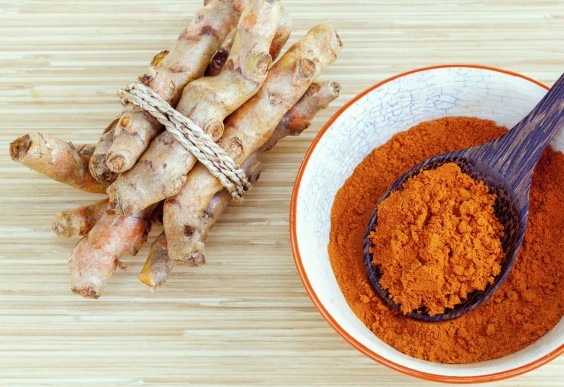Turmeric, the golden-yellow spice that packs a flavorful punch in our favorite Indian curries and adds color to mustard, is having a major moment in the health food world. With claims that it can do everything from control acne to inhibit cancer cell growth to cure depression, it's no wonder that people are rushing to incorporate more of it into their diets.1
"Turmeric is a spice and a medicinal herb that's been used in India for thousands of years," says Melissa Young, M.D., an integrative medicine specialist at the Wellness Institute at Cleveland Clinic. Today it's found in everything from juices and chips to energy bites and nuts to tons of powders and supplements. But keep reading before you pull out your debit card to buy that shot at your fave juice shop.

What Is Turmeric?
Although it's green and leafy out in the wild, you're probably not used to seeing turmeric that way because it's usually harvested for its rhizomes—the knobby stems that grow underground and can send out roots—which are turned into a dried, powdered form.
The active ingredient in turmeric is curcumin (nope, not related to cumin), and although it was isolated from the herb some two centuries ago, it's that compound that scientists are still excited about today.2
The Health Claims
In Chinese and Ayurvedic medicine, turmeric is used to relieve arthritis pain, regulate menstruation, and heal wounds. The National Center for Complementary and Integrative Health also notes that preliminary findings suggest curcumin "may have anti-inflammatory, anticancer, and antioxidant properties."
In recent years, preliminary research suggests curcumin could decrease cholesterol, eliminate some symptoms of irritable bowel syndrome, aid the process of healing wounds, treat acne, and improve liver and cardiovascular function. 3 A recent study also found that curcumin may help prevent or relieve certain mood disorders or dementia in older populations.4
The Scientific Evidence
However, the National Institutes of Health maintains there's "little reliable evidence" for using turmeric to treat health conditions. While it's been widely studied when it comes to inflammation, osteoarthritis, and treating irritable bowel syndrome symptoms, the NIH cautions that few of these findings come from clinical trials with a randomized human sample.
"I think there is substantive evidence that it helps with inflammation, but we need to be careful when talking about cancer and Alzheimer's," Young says.
The Takeaway
Turmeric can be used to help relieve certain symptoms, like inflammation or even the joint pain associated with osteoarthritis, but it's not a cure for serious diseases. Adding it to your diet may make you feel better faster (especially after a tough workout), and consuming it doesn’t have serious downsides for the average person, but don't expect any miracles.
Works Cited
- Curcumin for the treatment of major depression: a randomised, double-blind, placebo controlled study. Lopresti AL, Maes M, Maker GL. Journal of affective disorders, 2014, Jun.;167():1573-2517.
- Curcumin: the Indian solid gold. Aggarwal BB, Sundaram C, Malani N. Advances in experimental medicine and biology, 2007, Jul.;595():0065-2598.
- Curcumin, Inflammation, and Chronic Diseases: How Are They Linked? He Y, Yue Y, Zheng X. Molecules (Basel, Switzerland), 2015, May.;20(5):1420-3049.
Chemopreventive properties of curcumin. Campbell FC, Collett GP. Future oncology (London, England), 2006, May.;1(3):1479-6694.
Curcumin and inflammatory bowel disease: potential and limits of innovative treatments. Vecchi Brumatti L, Marcuzzi A, Tricarico PM. Molecules (Basel, Switzerland), 2014, Dec.;19(12):1420-3049.
Curcumin induces changes in expression of genes involved in cholesterol homeostasis. Peschel D, Koerting R, Nass N. The Journal of nutritional biochemistry, 2006, May.;18(2):0955-2863.
Cardiovascular protection by curcumin: molecular aspects. Kapakos G, Youreva V, Srivastava AK. Indian journal of biochemistry & biophysics, 2013, Feb.;49(5):0301-1208.
Investigation of the effects of solid lipid curcumin on cognition and mood in a healthy older population. Cox KH, Pipingas A, Scholey AB. Journal of psychopharmacology (Oxford, England), 2014, Oct.;29(5):1461-7285.
In vitro anti-propionibacterium activity by curcumin containing vesicle system. Liu CH, Huang HY. Chemical & pharmaceutical bulletin, 2013, Oct.;61(4):1347-5223. - Investigation of the effects of solid lipid curcumin on cognition and mood in a healthy older population. Cox KH, Pipingas A, Scholey AB. Journal of psychopharmacology (Oxford, England), 2014, Oct.;29(5):1461-7285.
No comments:
Post a Comment